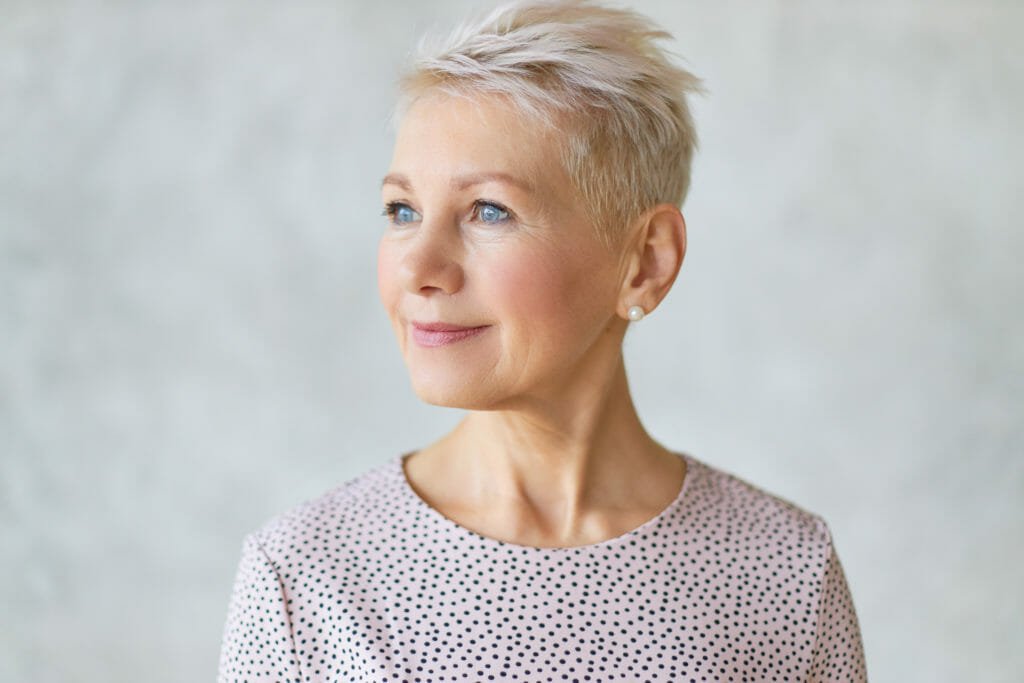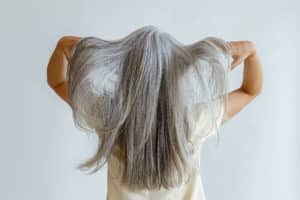Are You Losing Your Hair? Here’s Help…

Hair loss.
It can be one of the distressing things about the menopause journey. Even if it doesn’t shed it often loses its lustrous, glossy volume. We’re sorry to be the bearers of bad news and we totally understand the frustration. Indeed, there’s a reason our hair has earned the common moniker ‘crowning glory’.
Personally, I’ve got fine hair and I’ve always dreamed of having a voluminous mane. However, with age, it’s becoming even finer so this is something I’m struggling with too. I’ve also noticed my parting growing wider which is not unusual for many of us. And – apologies again – but bald patches can also occur.
So I was delighted when LotsaLocks® arrived! She’s my new BFF, or can’t-live-without-product (and probably yours too).
Why does our hair thin/reduce at menopause?
Hormonal changes
Like so many of the signs of perimenopause / menopause alterations in hair quantity and texture can be due to hormonal imbalance. There are complex hormonal shifts going on in our bodies and it’s not just about estrogen. Thyroid function, high testosterone and/or cortisol, insulin resistance and too much estrogen all play a role. It’s a key reason we offer Merry Perry® and Perky Post® because they help support this hormonal dance.
Nutritional deficiency
At the risk of sounding like a broken record, your nutrient levels are a crucial component to getting through peri/menopause well. Micronutrients like iron, zinc, magnesium, vitamin D, all of the B vitamins especially biotin (B7), B6 and B12, EFAs (essential fatty acids), and silica can all help far more than a shampoo bottle that promises miracles too. (That bottle – if it’s all-natural – might provide a temporary boost though 😊. )
Environmental & lifestyle factors
We live in a toxic world so it’s smart to take into account what you’re using in your life. For example, take a look through your personal care products, cleaners and what you’re exposed to indoors and outdoors. These influences often contain known endocrine (hormone) disruptors. In addition, too much stress – whether that be from the kids, a large work deadline or overexercising – isn’t a friend to our follicular health.
Related: Trichologist Chelcey Salinger Unravels Midlife Hair Loss & Thinning
What Can You Do?
Get your thyroid tested
Thyroid health can be an issue during perimenopause. And problems often fly under the radar as standard testing only measures TSH levels when T3 and T4 are important too. It’s one of the reasons I recommend seeking out a functional medicine doctor for a full thyroid panel test.
Again, it’s complicated. But to put it simply if T3 and T4 are too low it can lead to hypothyroidism and if they’re too high they cause hyperthyroidism. Hair grows in a three-stage cycle – anagen (growth), catagen (rest) and telogen (shed). And the thyroid hormone has the ability to turn this on or off in some cases.
Ensure your liver, gut and blood sugar health is spot on
Hormonal issues such as insulin resistance, high cortisol, and estrogen dominance can all be helped by ensuring optimal liver functioning. When the liver isn’t healthy hormones can’t circulate and convert well. Consequently, any excess can’t be flushed out causing them to build up in our system.
In addition, more research is coming out to link digestive health and balanced blood sugars with a smooth peri/menopause. This underlines how the liver, the gut and blood sugar levels are key to hormonal balance (and weight management). From a hair point of view, this can lead to a disruption of the growth cycle, follicle miniaturisation and/or hair shedding.
Check out Happy Go Tummy® for a happy gut.
Make being stress-free a priority
During menopause, the production of estrogen moves from the ovaries to the adrenals. As a result, the stress hormone cortisol factors in big-time during the meno years. This can lead to issues like anxiety, weight gain, sleep issues and – yep – hair loss. So when we encourage mindfulness, breath work and yoga it’s not woo woo it’s essential for your midlife health. And if your body’s prioritising your stress factor, it deems your hair unimportant.
Read this article here to see what science says about mindfulness.

Some excellent supplements that may help:
Biotin (vitamin B7)
Contributes to the production of the protein found in hair, skin, and nails – keratin. It’s a water-soluble vitamin which means the body doesn’t store it. It can be found naturally in egg yolks, cheese, leafy greens, mushrooms, nuts. It’s also in LotsaLocks®!
Iron
Iron deficiency is one of the most common causes of hair loss, and as it’s an essential nutrient you must get it from food. Foods such as shellfish, spinach (as Popeye made famous!), legumes, broccoli, tofu, red meat and dark chocolate all boost iron. Red Seal’s Floradix Floravital is an excellent (and tasty) liquid iron supplement you can find at the supermarket.
Tip: If you’re experiencing heavy bleeding in peri, get your iron levels checked.
Zinc
An essential mineral to hormone health, a lack of zinc has been associated with hair loss. It’s also key to many bodily processes and immunity. A simple saliva test at your local health store will let you know if you’re deficient. If you can’t get one there ask your GP. Zinc foods include nuts, seeds, eggs, meat, shellfish. Also pumpkin seeds and oysters are well-known zinc providers!
Silica
One of my hairdressers – a top celeb artisan in Sydney – recommends taking liquid silica to boost hair growth and volume. He suggests not getting a formula mixed with other ingredients, look for pure silica. Silica is a trace mineral and is also extremely good for bone and teeth health – something else 40+ women also need to focus on. Food sources include whole grains, oats, leafy greens, asparagus, cucumber, melons and green beans. Another bonus? Silica is helpful for skin elasticity and collagen (plumping) formation.
EFA’s (essential fatty acids)
EFA’s have been associated with hair loss.
It’s essential to get the right balance of omega-3 and omega-6 fatty acids with the recommendation being 4:1. Most people on the standard supermarket diet ingest too much omega-6 which has been linked with high blood pressure and blood clots as well as weight gain (study).
How to avoid this?
Omega-6 fats mainly come from vegetable oils like safflower and sunflower. They have heart and cholesterol benefits and – most importantly for us – hormone-balancing properties. To get the balance right it’s a good idea to use omega-6 moderately and emphasise omega-3 rich foods. These include oily fish, fish oil, walnuts, flaxseeds (and flaxseed oil). Tip:
On the subject of hair? Get enough EFA’s and your hair texture and strength should improve.
A word about autoimmune disease & hair
Autoimmune conditions such as Alopecia, Hashimoto’s thyroiditis and Grave’s disease can contribute to hair loss. Getting your liver, blood sugar and gut health on track may help.
And the star of the show….
LotsaLocks® with keraGEN-IV® and Biotin
We’ve created LotsaLocks® to support thick, healthy hair from the inside out! It uses keraGEN-IV® which is an ethically sourced keratin protein and biotin.®










